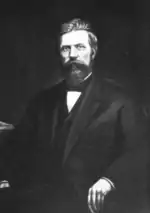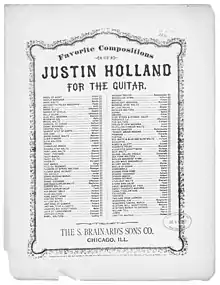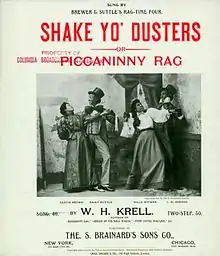S. Brainard Sons
S. Brainard Sons (also known as S. Brainard's Sons and S. Brainard & Sons) was a music publisher, music periodical publisher, and musical instrument retailer based in Cleveland, Ohio and then Chicago, Illinois. The company was founded in 1836 by Silas Brainard with Henry J. Mould.[1] The business published music and songbooks including political and patriotic music.[2] Brainard also published the periodical Western Musical World which was eventually renamed Brainard's Musical World.[3][4] The Library of Congress has a collection of their sheet music.[5] The New York Public Library has copies of their periodical in its collection.[4]
History

Brainard sold Chickering & Sons pianos.[2] It acquired Chicago publisher Root & Cady's plates in 1871[6] after the Great Chicago Fire and eventually relocated to Chicago.
Music periodical
The music journal was published from 1864 until 1895 when it was merged with Etude.[3] The content of each issue included a musician's biography. The publication competed with Root and Cady's Song Messenger of the Northwest.[3]
Karl Merz became an editor of Brainard's Musical World.
Selected publications
- School Chimes, A New School Music Book (1874) written by the hymn composer James Ramsey Murray
- "Weston's March to Chicago" (1867), composed by Edward Mack; publisher: (List of songs about Chicago)
- "Keep the Horse Shoe Over the Door"[7]
- Fanny Crosby's Six Songs by Wurzel (1855):[8] "O How Glad to Get Home",[9] "Honeysuckle Glen",[10][11][12] "The Church in the Wood," "All Together Now",[13] and "Proud World, Good-by".[14] The most popular of these songs was "Rosalie, the Prairie Flower",[15][16] about the death of a young girl.[17] It was popularized in the 1850s by the Christy Minstrels;[18] it sold more than 125,000 copies of sheet music and earned nearly $3,000 in royalties for Root[19] —and almost nothing for Crosby.[20]
- Francis Boott's "The Convict's Lullaby" (Henry Kirke White); revised 1874
- William Krell's "Mississippi Rag" January 27, 1897 and "Shake Yo' Dusters of Piccaninny Rag"
- Eben Eugene Rexford's "Rosa Lee" (1890), music by H. C. Verner
- Lucia di Lamermoor (1868), arranged by Justin Holland
Gallery

 Guitar music published after the firm moved to Chicago
Guitar music published after the firm moved to Chicago
 List of works from the 1868 cover of Lucia di Lamermoor, arranged by Justin Holland and published in Chicago by S. Brainard Sons
List of works from the 1868 cover of Lucia di Lamermoor, arranged by Justin Holland and published in Chicago by S. Brainard Sons William Krell's "Piccaninny Rag", 1898
William Krell's "Piccaninny Rag", 1898
References
- "Brainard - IMSLP/Petrucci Music Library: Free Public Domain Sheet Music". imslp.org.
- "S. BRAINARD'S SONS". Encyclopedia of Cleveland History - Case Western Reserve University. May 11, 2018.
- J. Heywood Alexander (1980). "Brainard's (Western) Musical World". Notes. 36 (3): 601–614. doi:10.2307/939805. JSTOR 939805.
- "Brainard's musical world - NYPL Digital Collections". digitalcollections.nypl.org.
- co, s brainard's sons. "Search results from Historic Sheet Music Collection, 1800 to 1922, S. Brainard's Sons Co". Library of Congress, Washington, D.C. 20540 USA.
- "Root & Cady - IMSLP/Petrucci Music Library: Free Public Domain Sheet Music". imslp.org.
- Cockrell, Dale (January 3, 2019). The Ingalls Wilder Family Songbook. A-R Editions, Inc. ISBN 9780895796875 – via Google Books.
- Carder (2008), pp. 62–65; 196; n.75, 215.
- "Glad to Get Home" (1855), Words and Music attributed to Wurzel (G. F. R.) [pseud. for George Frederick Root, 1820–1895] from Six Songs by Wurzel, Cleveland, OH: S. Brainard’s Sons [Source: 1883-24139@LoC]
- "Six Songs by Wurzel. No. 2. The Honeysuckle Glen". Jscholarship.library.jhu.edu. Retrieved August 20, 2013.
- "The Honeysuckle Glen" (No. 2 from Six Songs by Wurzel), The Music of George Frederick Root (1820–1895)
- For lyrics, see Crosby & Lowry (1899), pp. 134–35.
- "Six Songs by Wurzel. No. 5. All Together Again". Jscholarship.library.jhu.edu. Retrieved August 20, 2013.
- "Proud World Good Bye! I'm Going Home", Six Songs by Wurzel, Cleveland, OH: S. Brainard's Sons.
- "Seven Popular Songs by Wurzel", jscholarship.library.jhu.edu; accessed December 11, 2014.
- For lyrics, see "Rosalie the Prairie Flower" by George Frederick Root (1855), or Crosby & Lowry (1899), pp. 132–33.
- Carder (2008), n.75, p. 215.
- "Rosalie, The Prairie Flower", Best Loved Songs of The American People, Denes Agay (ed.), Garden City, NY: Doubleday & Company, 1975.
- Carder (2008), n.82, p. 215.
- Ellen Koskoff, Women and Music in Cross-Cultural Perspective, University of Illinois Press, 1989, p. 184.
Further reading
- Bomberger, E. Douglas (1999). "Introduction". Brainard's Biographies of American Musicians, pp. xi–xvi. Greenwood Publishing Group. ISBN 0313307822